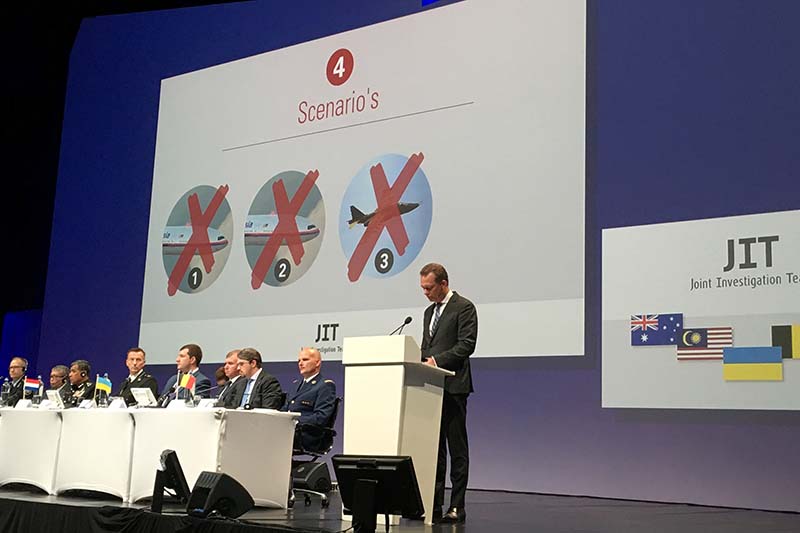Families: investigation found MH17 downed from pro-Russia rebel held territory
NIEUWEGEIN, NETHERLANDS: International prosecutors investigating the downing of a Malaysian airliner two years ago have concluded it was shot down by a Russian-made missile fired from rebel-held territory in eastern Ukraine, victims' family members said on Wednesday.
Families were informed of the prosecutors' findings shortly before a news conference was due to start in the central Dutch city of Nieuwegein on the outcome of the investigation.
A surface-to-air missile hit Malaysia Airlines Flight 17 on its way from Amsterdam to Kuala Lumpur on July 17, 2014, killing all 298 people aboard, most of them Dutch citizens.
Robby Oehlers, the cousin of 20-year-old victim Daisy Oehlers, said investigators had also identified 100 potential suspects in the plane's downing.
Families were also told that the Buk missile system that was used to shoot down the plane had been transported from Russia into Ukraine, and was returned to Russia immediately afterward.
The Kremlin said before the family members spoke that radar data showed the plane was not brought down by a rocket fired from territory held by pro-Russian separatists in eastern Ukraine.
"First-hand radar data identified all flying objects which could have been launched or in the air over the territory controlled by rebels at that moment," Kremlin spokesman Dmitry Peskov said in Moscow.
"The data are clear-cut...there is no rocket. If there was a rocket, it could only have been fired from elsewhere."
At the time of the incident, pro-Russian separatists were fighting Ukrainian government forces in the region. The Boeing 777 broke apart in midair, flinging wreckage over several kilometres (miles) of fields in rebel-held territory.
The prosecutors from the Netherlands, Australia, Belgium, Malaysia and Ukraine have said they will release details of the firing location and type of BUK missile used in the attack, taking them a step closer to identifying individual culprits.
Prosecutors cannot file charges because there is no international agreement on what court a case would be heard in.
Silene Fredriksz, whose 23-year-old son Bryce was on the airplane with his girlfriend, Daisy Oehlers expects the investigators to say the missile was fired from the rebel-held town of Snizhne.
"We will be able to deduce whether it was Russian or Ukrainian. And I think we will just get a confirmation of what we have thought for months: that is was the prior," Fredriksz said before meeting investigators.
"This is an important step. As a family we are impatient. We want to know what happened, how it happened and why. We want those responsible to face justice," she said.
If the investigation confirms that theory, which is supported by photographic evidence and witness statements collected by Reuters, it will directly challenging Moscow's suggestion that the plane was brought down by the Ukrainian military.
At the time, the nearest Ukrainian-held area was about 6 km (3.7 miles) away.
The downing played a significant part in a decision by the European Union and United States to impose sanctions on Russia over the Ukraine conflict, and East-West tensions escalated to levels not seen since the Cold War ended.
Ukrainian and Western officials, citing intelligence intercepts, have blamed pro-Russian rebels for the incident. Russia has always denied direct involvement in the Ukraine conflict and rejects responsibility for the destruction of MH17.
A civilian investigation into the cause of the incident by the Dutch Safety Board concluded last year that the airliner had been downed by a Russian-made BUK missile launched from eastern Ukraine.
Dutch prosecutor Fred Westerbeke, head of the investigative team, said earlier it had a "long list of persons of interest" in the case and had been analysing airplane debris and ballistics found at the scene.
Prosecutors could also indicate what charges they are considering bringing - for instance criminal negligence.
Prosecutors have sought legal assistance from Moscow since October 2014, and visited in person for a week in July.
"Russian authorities have offered information in the past, but have not answered all questions," they said in a statement at the time.






